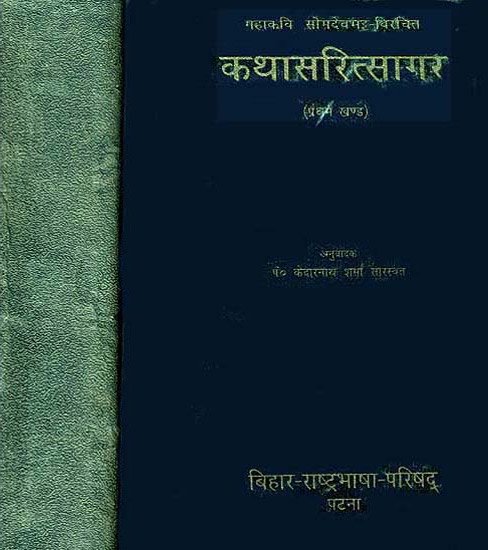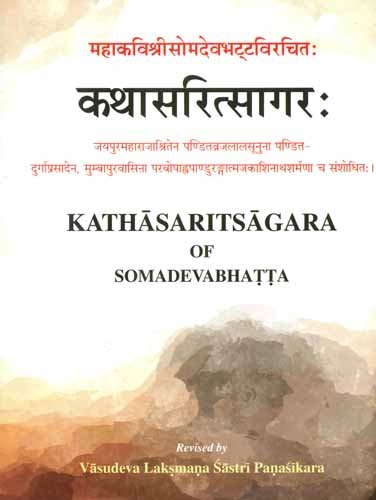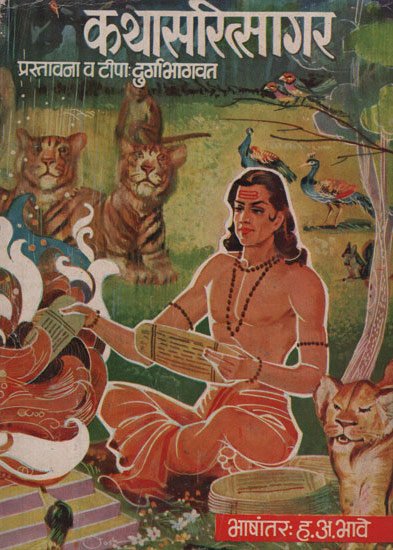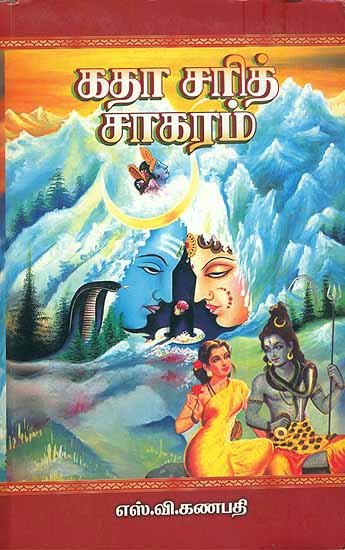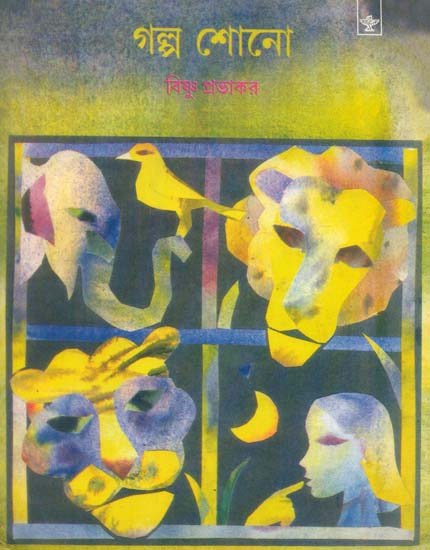Kathasaritsagara [sanskrit]
by C. H. Tawney | 2014 | 226,424 words | ISBN-13: 9789350501351
The Sanskrit edition of the Kathasaritsagara referencing the English translation and grammatical analysis. Written by Somadeva and dating from the 12th century, the Kathasaritsagara (or Katha-sarit-sagara) represents an epic legend narrating the adventures of Naravahanadatta as he strives to become the destined emperor of the Vidyadharas. Alternative titles: (Kathāsaritsāgara, कथासरित्सागर, Kathā-sarit-sāgara)
Verse 4.3.94
तं च क्रीडाकलितललिताव्यक्तनर्माभिलाषं यान्तं प्रीतिप्रवणमनसाम् अङ्कतो ऽङ्कं नृपाणाम् ।
पुत्रं स्मेराननसरसिजं सादरं पश्यतस् ते बद्ध्वानन्दाः किम् अपि दिवसा वत्सराजस्य जग्मुः ॥ ९४ ॥
taṃ ca krīḍākalitalalitāvyaktanarmābhilāṣaṃ yāntaṃ prītipravaṇamanasām aṅkato 'ṅkaṃ nṛpāṇām |
putraṃ smerānanasarasijaṃ sādaraṃ paśyatas te baddhvānandāḥ kim api divasā vatsarājasya jagmuḥ || 94 ||
The English translation of Kathasaritsagara Verse 4.3.94 is contained in the book The Ocean of Story by C.H. Tawney. This book is available online or you could buy the latest edition:
Read online Buy now! The English translation by C.H. Tawney (2014)
Glossary of Sanskrit terms
Note: This extracts Sanskrit terms and links to English definitions from the glossary, based on an experimental segmentation of verse (4.3.94). Some terms could be superfluous while some might not be mentioned. Click on the word to show English definitions.
Krida, Akalita, Lalita, Avyakta, Narma, Narman, Abhilasha, Yat, Priti, Pravana, Anas, Anka, Nripa, Nripana, Putra, Smera, Anasa, Rasin, Sadaram, Sadara, Pashyat, Pashyata, Tad, Yushmad, Baddhva, Ananda, Kim, Api, Divasa, Vatsaraja,
Analysis of Sanskrit grammar
Note: this is an experimental feature and only shows the first possible analysis of the Sanskrit text (Kathasaritsagara Verse 4.3.94). If the system was successful in segmenting the sentence, you will see of which words it is made up of, generally consisting of Nouns, Pronouns, Verbs, Participles and Indeclinables. Click on the link to show all possible derivations of the word.
- Line 1: “taṃ ca krīḍākalitalalitāvyaktanarmābhilāṣaṃ yāntaṃ prītipravaṇamanasām aṅkato 'ṅkaṃ nṛpāṇām ”
- tam -
-
ta (noun, masculine)[adverb], [accusative single]ta (noun, neuter)[adverb], [nominative single], [accusative single]tā (noun, feminine)[adverb]tan (noun, masculine)[adverb]sa (noun, masculine)[accusative single]
- ca -
-
ca (indeclinable conjunction)[indeclinable conjunction]ca (noun, masculine)[compound], [vocative single]ca (noun, neuter)[compound], [vocative single]
- krīḍā -
-
krīḍa (noun, masculine)[compound], [vocative single]krīḍa (noun, neuter)[compound], [vocative single]krīḍā (noun, feminine)[nominative single]√krīḍ (verb class 1)[imperative active second single]
- akalita -
-
akalita (noun, masculine)[compound], [vocative single]akalita (noun, neuter)[compound], [vocative single]
- lalitā -
-
lalita (noun, masculine)[compound], [vocative single]lalita (noun, neuter)[compound], [vocative single]√lal -> lalita (participle, masculine)[compound from √lal]√lal -> lalita (participle, neuter)[compound from √lal]lalitā (noun, feminine)[nominative single]√lal -> lalita (participle, masculine)[vocative single from √lal class 1 verb], [vocative single from √lal]√lal -> lalita (participle, neuter)[vocative single from √lal class 1 verb], [vocative single from √lal]√lal -> lalitā (participle, feminine)[nominative single from √lal class 1 verb], [nominative single from √lal]√lal (verb class 1)[periphrastic-future active third single]
- avyakta -
-
avyakta (noun, masculine)[compound], [vocative single]avyakta (noun, neuter)[compound], [vocative single]
- narmā -
-
narma (noun, masculine)[compound], [vocative single]narman (noun, neuter)[compound], [adverb], [nominative single], [vocative single], [accusative single]
- abhilāṣam -
-
abhilāṣa (noun, masculine)[adverb], [accusative single]
- yāntam -
-
yāt (noun, masculine)[adverb], [accusative single]
- prīti -
-
prīti (noun, feminine)[compound], [adverb]prītī (noun, masculine)[adverb], [vocative single]prītī (noun, feminine)[compound], [adverb], [vocative single]prītī (noun, neuter)[compound], [adverb], [nominative single], [vocative single], [accusative single]
- pravaṇam -
-
pravaṇa (noun, masculine)[adverb], [accusative single]pravaṇā (noun, feminine)[adverb]
- anasām -
-
anas (noun, neuter)[genitive plural]
- aṅkato' -
-
√aṅk (verb class 1)[present active third dual]
- aṅkam -
-
aṅka (noun, masculine)[adverb], [accusative single]aṅka (noun, neuter)[adverb], [nominative single], [accusative single]
- nṛpāṇām -
-
nṛpa (noun, masculine)[genitive plural]nṛpāṇā (noun, feminine)[accusative single]
- Line 2: “putraṃ smerānanasarasijaṃ sādaraṃ paśyatas te baddhvānandāḥ kim api divasā vatsarājasya jagmuḥ ”
- putram -
-
putra (noun, masculine)[adverb], [accusative single]putra (noun, neuter)[adverb], [nominative single], [accusative single]putrā (noun, feminine)[adverb]
- smerān -
-
smera (noun, masculine)[accusative plural]
- anasa -
-
anasa (noun, masculine)[compound], [vocative single]anasa (noun, neuter)[compound], [vocative single]
- rasi -
-
rasin (noun, masculine)[compound], [adverb]rasin (noun, neuter)[compound], [adverb], [nominative single], [vocative single], [accusative single]
- jam -
-
ja (noun, masculine)[adverb], [accusative single]ja (noun, neuter)[adverb], [nominative single], [accusative single]jā (noun, feminine)[adverb]
- sādaram -
-
sādaram (indeclinable)[indeclinable]sādara (noun, masculine)[adverb], [accusative single]sādara (noun, neuter)[adverb], [nominative single], [accusative single]sādarā (noun, feminine)[adverb]
- paśyatas -
-
paśyat (noun, masculine)[accusative plural], [ablative single], [genitive single]paśyat (noun, neuter)[ablative single], [genitive single]paśyata (noun, masculine)[nominative single]
- te -
-
ta (noun, masculine)[locative single]ta (noun, neuter)[nominative dual], [vocative dual], [accusative dual], [locative single]tā (noun, feminine)[nominative dual], [vocative single], [vocative dual], [accusative dual]tad (noun, neuter)[nominative dual], [accusative dual]sa (noun, masculine)[nominative plural]sā (noun, feminine)[nominative dual], [accusative dual]yuṣmad (pronoun, none)[dative single], [genitive single]
- baddhvā -
-
√bandh -> baddhvā (absolutive)[absolutive from √bandh]√bandh -> baddhvā (absolutive)[absolutive from √bandh]√bandh -> baddhvā (absolutive)[absolutive from √bandh]baddhvā (noun, feminine)[nominative single]
- anandāḥ -
-
ananda (noun, masculine)[nominative plural], [vocative plural]anandā (noun, feminine)[nominative plural], [vocative plural], [accusative plural]
- kim -
-
kim (indeclinable interrogative)[indeclinable interrogative]kim (indeclinable)[indeclinable]kim (pronoun, neuter)[nominative single], [accusative single]
- api -
-
api (indeclinable preposition)[indeclinable preposition]ap (noun, neuter)[locative single]
- divasā* -
-
divasa (noun, masculine)[nominative plural], [vocative plural]
- vatsarājasya -
-
vatsarāja (noun, masculine)[genitive single]
- jagmuḥ -
-
√gam (verb class 1)[perfect active third plural]√gam (verb class 2)[perfect active third plural]√gam (verb class 3)[perfect active third plural]
Other editions:
Also see the following editions of the Sanskrit text or (alternative) English translations of the Kathasaritsagara Verse 4.3.94
Kathasaritsagar
by Kedarnath Sharma Saraswat (2005)
The Only Edition with the Sanskrit Text and its Hindi Translation (An Old and Rare Book) Set of 3 Vol.
Buy now!
Kathasaritsagara of Somadeva Bhatta (Sanskrit Text Only)
by Vasudeva Laksmana Sastri (2013)
Katha Sarit Sagar in Marathi
by H. A Bhave (1995)
Set of 5 Volumes; Published by Varada Books, Pune. 2256 pages (Throughout B/W Illustrations).
Buy now!
Katha Sarit Sagara (Tamil)
by S. V. Ganapati (எஸ். வி. கணபதி) (2014)
[கதா சரித் சாகரம்] Published by Alliance Publications.
Buy now!
Galpa Shono
by Abhijit Chattopadhyay (2014)
[গল্প শোনো] Galpa Shono: Bengali Translation of 'Suno Kahani From Katha Sarit Sagar'; 9788126015436; Published by Sahitya Akademi, Delhi.
Buy now!Preview of verse 4.3.94 in Bengali sript:
তং চ ক্রীডাকলিতললিতাব্যক্তনর্মাভিলাষং যান্তং প্রীতিপ্রবণমনসাম্ অঙ্কতো ঽঙ্কং নৃপাণাম্ ।
পুত্রং স্মেরাননসরসিজং সাদরং পশ্যতস্ তে বদ্ধ্বানন্দাঃ কিম্ অপি দিবসা বত্সরাজস্য জগ্মুঃ ॥ ৯৪ ॥
![Kathasaritsagara [sanskrit] - book cover](/uploads/a/Katha-Sarit-Sagara.jpg)
